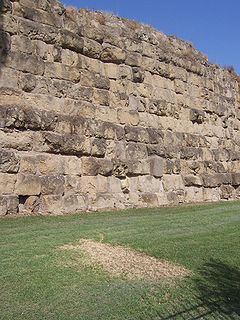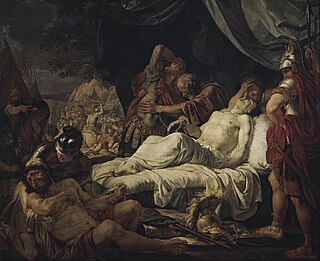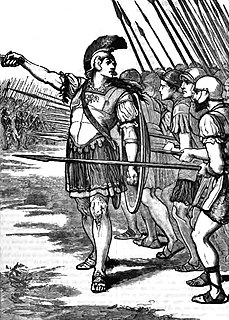
Year 378 BC was a year of the pre-Julian Roman calendar. At the time, it was known as the Year of the Tribunate of Medullinus, Fidenas, Lanatus, Siculus, Pulvillus and Macerinus. The denomination 378 BC for this year has been used since the early medieval period, when the Anno Domini calendar era became the prevalent method in Europe for naming years.
This article concerns the period 379 BC – 370 BC.
This article concerns the period 369 BC – 360 BC

Thebes is a city in Boeotia, Central Greece. It played an important role in Greek myths, as the site of the stories of Cadmus, Oedipus, Dionysus, Heracles and others. Archaeological excavations in and around Thebes have revealed a Mycenaean settlement and clay tablets written in the Linear B script, indicating the importance of the site in the Bronze Age.

Boeotia, sometimes Latinized as Boiotia or Beotia, formerly known as Cadmeis, is one of the regional units of Greece. It is part of the region of Central Greece. Its capital is Livadeia, and its largest city is Thebes.
Year 375 BC was a year of the pre-Julian Roman calendar. At the time, it was known as the First year without Tribunate or Consulship. The denomination 375 BC for this year has been used since the early medieval period, when the Anno Domini calendar era became the prevalent method in Europe for naming years.

Year 371 BC was a year of the pre-Julian Roman calendar. At the time, it was known as the Fifth year without Tribunate or Consulship. The denomination 371 BC for this year has been used since the early medieval period, when the Anno Domini calendar era became the prevalent method in Europe for naming years.
Year 369 BC was a year of the pre-Julian Roman calendar. At the time, it was known as the Year of the Tribunate of Fidenas, Cicurinus, Cossus, Cornelius, Cincinnatus and Ambustus. The denomination 369 BC for this year has been used since the early medieval period, when the Anno Domini calendar era became the prevalent method in Europe for naming years.
Year 364 BC was a year of the pre-Julian Roman calendar. At the time, it was known as the Year of the Consulship of Peticus and Calvus. The denomination 364 BC for this year has been used since the early medieval period, when the Anno Domini calendar era became the prevalent method in Europe for naming years.

Epaminondas was a Greek general of Thebes and statesman of the 4th century BC who transformed the Ancient Greek city-state, leading it out of Spartan subjugation into a pre-eminent position in Greek politics called the Theban Hegemony. In the process, he broke Spartan military power with his victory at Leuctra and liberated the Messenian helots, a group of Peloponnesian Greeks who had been enslaved under Spartan rule for some 230 years after being defeated in the Messenian War ending in 600 BC. Epaminondas reshaped the political map of Greece, fragmented old alliances, created new ones, and supervised the construction of entire cities. He was also militarily influential and invented and implemented several major battlefield tactics.

Pelopidas was an important Theban statesman and general in Greece, instrumental in establishing the mid-fourth century Theban hegemony.

The Battle of Leuctra was a battle fought on 6 July 371 BC between the Boeotians led by the Thebans, and the Spartans along with their allies amidst the post-Corinthian War conflict. The battle took place in the neighbourhood of Leuctra, a village in Boeotia in the territory of Thespiae. The Theban victory shattered Sparta's immense influence over the Greek peninsula, which Sparta had gained with its victory in the Peloponnesian War a generation earlier.
The Sacred Band of Thebes was a troop of select soldiers, consisting of 150 pairs of male lovers which formed the elite force of the Theban army in the 4th century BC, ending Spartan domination. Its predominance began with its crucial role in the Battle of Leuctra in 371 BC. It was annihilated by Philip II of Macedon in the Battle of Chaeronea in 338 BC.
Gorgidas was the first known Theban military leader of the Sacred Band of Thebes around 378 BC.

The Theban hegemony lasted from the Theban victory over the Spartans at Leuctra in 371 BC to their defeat of a coalition of Peloponnesian armies at Mantinea in 362 BC, though Thebes sought to maintain its position until finally eclipsed by the rising power of Macedon in 346 BC.
Boeotarch was the title of the chief officers of the Boeotian Confederacy, founded in 379 BC after a rebellion freed the cities of Boeotia from Spartan dominance. There were seven Boeotarchs, democratically elected from seven electoral districts throughout Boeotia. As the largest city of the region, Thebes generally elected four of the Boeotarchs, while the other three represented outlying districts. The number of Boeotarchs, however, may not have remained constant at seven. They may have not even represented districts in the same way as the earlier Boeotian League.
The Battle of Tegyra was an ancient Greek battle between Theban and Spartan hoplite forces. In the battle, a Theban army under Pelopidas was challenged by a substantially larger Spartan force while retreating from an abortive attack on Orchomenus, but successfully attacked and routed the Spartans. The battle marked the first occasion in the historical record in which a Spartan force had been defeated by a numerically inferior enemy in a set battle.

Classical Greece was a period of around 200 years in Ancient Greece, marked by much of the eastern Aegean and northern regions of Greek culture gaining increased autonomy from the Persian Empire; the peak flourishing of democratic Athens; the First and Second Peloponnesian Wars; the Spartan and then Theban hegemonies; and the expansion of Macedonia under Philip II. Much of the early defining politics, artistic thought, scientific thought, theatre, literature and philosophy of Western civilization derives from this period of Greek history, which had a powerful influence on the later Roman Empire. The Classical era ended after Philip II's unification of most of the Greek world against the common enemy of the Persian Empire, which was conquered within 13 years during the wars of Alexander the Great, Philip's son.
The Boeotian War broke out in 378 BC as the result of a revolt in Thebes against Sparta. The war saw Thebes become dominant in the Greek World at the expense of Sparta. However, by the end of the war Thebes’ greatest leaders, Pelopidas and Epaminondas, were both dead and Thebes power already waning, allowing for the Rise of Macedon.

The Theban–Spartan War of 378–362 BC was a series of military conflicts fought between Sparta and Thebes for hegemony over Greece. Sparta had emerged victorious from the Peloponnesian War against Athens, and occupied an hegemonic position over Greece. However, the Spartans' violent interventionism upset their former allies, especially Thebes and Corinth. The resulting Corinthian War ended with a difficult Spartan victory, but the Boeotian League headed by Thebes was also disbanded.








